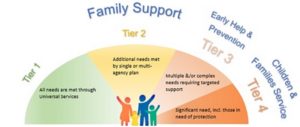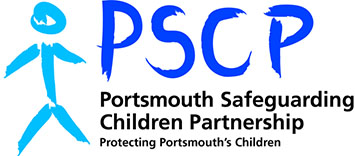Family Support Plan
Family Support is our approach in Portsmouth to delivering early help to families. Its aim is to ensure that we are providing the right support to families, at the right time, to achieve positive change.
Family Support can be delivered to parents, children or whole families, but the main focus is to improve outcomes for children and help prevent any situation from escalating, or further problems arising.
A Family Support Plan (FSP) should be used when families have agreed to receiving early help. The FSP will help to identify the family’s strengths and challenges that they may be experiencing and agree a plan to support the identified needs.
You should always refer to the Thresholds Document to consider where a family’s needs fit on the continuum of need, to ensure that you are offering the right support at the right time.

There are many reasons for which a family may benefit from Family Support. Practitioners should, in particular, be alert to the potential need for early help for a child who:
- is disabled and has specific additional needs
- has special educational needs (whether or not they have a statutory Education, Health and Care Plan)
- is a young carer
- is showing signs of being drawn into anti-social or criminal behaviour, including gang involvement and association with organised crime groups
- is frequently missing/goes missing from care or from home
- is at risk of modern slavery, trafficking or exploitation
- is at risk of being radicalised or exploited
- is in a family circumstance presenting challenges for the child, such as drug and alcohol misuse, adult mental health issues and domestic abuse
- is misusing drugs or alcohol themselves
- has returned home to their family from care
- is a privately fostered child
- has a parent/carer in custody
This list is not exhaustive, and you should refer to the Indicators of Need that can be found in Thresholds Document for a comprehensive list. Families who would benefit from an FSP will typically have needs within either Tier 2 or 3 of the continuum of need:
Tier 2 – Additional Offer: Child/young person has additional needs that can be met by support from one or two agencies working with the family. Family Support Plans used to co-ordinate support.
Tier 3 – Targeted Offer: Children in families with increasing levels of multiple and complex problems. Families require a co-ordinated, whole family approach led by a lead worker or key worker, enabling the family to meet the children’s needs. Family Support Plans should be used
In Portsmouth, it is our practice that an FSP be completed to support all applications for an Education, Health & Care Plan (EHCP)
In order to begin an FSP, you will need to complete this form
We then ask for this completed document to be sent to FSP@portsmouthcc.gov.uk.
Please note, this is not a referral process and there will be no further action as a result of sending this to the FSP email address. All follow up actions for the family should be completed by the FSP Co-ordinator, the Team around the Family or the family themselves.
We have produced the following guidance for practitioners to help explain how the process of creating and reviewing an FSP works. You will also need to complete a FSP Review and a FSP Closure when appropriate.
We have also produced some guidance to support you in asking questions around the 10 aspects of life. This guidance provides you with questions to help gather information so that you can support the family to access the most relevant support.
The Day in the Life Tools will further help you to understand the lived experience for the child. Please find more information regarding this here
If you have any further queries, please email FSP@portsmouthcc.gov.uk
We have created a short video to explain the FSP process to families.
This is a voluntary process and consent must always be sought. In order to support families in their understanding of this process, we have created this leaflet
More detail as to what happens to the information shared can be found in the FSP privacy notice
For each of the 10 aspects of life in the FSP, we have put together a comprehensive guide as to the support available. These resources can be found here, we suggest you check this page regularly as it will be updated frequently to make sure it is as up to date as possible.
This list of resources includes details of support available to children, parent/carers and/or professionals. They will include details of services available locally as well as links to national helplines or sources of advice.
We have also produced some guidance to support you in asking questions around the 10 aspects of life. This guidance provides you with questions to help gather information so that you can support the family to access the most relevant support.
The Day in the Life Tools will further help you to understand the lived experience for the child. Please find more information regarding this here
There is a new digital solution which supports the Family Support Plan. The FSP Portal allows you to complete the Family Support Plan directly onto the portal, work collaboratively with others, and have an overview for all the children that have an FSP. Please see the guide for further details.
Key benefits of the FSP Portal include:
- Digital solution – A digital version of the FSP form
- Case management overview – Clear view for all children who have an FSP that you are either the lead or part of the team around the family
- Include other professionals – You can add in other professionals who are part of the TAF, they will be able to view the FSP and Plan
- Review Reminders – The portal will show at 6- and 12-week periods when a review is due
- Review will pre-populate – When starting a review, this will pull through all previous information from the original FSP
- Actions will pre-populate – Actions from the plan will pull through and allow for an update and to show progress and changes
- Transfer cases – If stepping across to another lead professional, you can transfer the ‘FSP Coordinator’ role
- Download & Print – You can download the FSP to enable it to be uploaded to your own system or print for the family
The FSP Portal will now replace the word version but you will need to register for an account before you use this. Please complete this form and email back to fsp@portsmouthcc.gov.uk and your account will be set up for you (If you are from a school and have access to the Insight Hub portal already, then your FSP account will have been already added).
Here are a selection of short videos to support you completing the different sections on the portal:
- Family Support Plans – LOGON
- Family Support Plans – portal overview
- Family Support Plans – creating a new plan
- Family Support Plans – adding professionals to a plan
- Family Support Plans – accepting transfer of a plan
- Family Support Plans – adding and downloading documents on a plan
- Family Support Plans – printing or producing a PDF of a plan
- Family Support Plans – reviewing a plan
- Family Support Plans – closing a plan
Any professional working with the family who identifies that a family is having difficulties that are affecting the child’s well-being should have a conversation with the family to explore the situation and work with them and other professionals to coordinate an appropriate plan of support
Some families may have difficulties that become more complex and may require a targeted intervention. A referral to Early Help and Prevention could be completed to enable this support to take place. The service is provided by Portsmouth City Council and Solent NHS Trust.
There are two routes for referrals into Targeted Tier 3 services; via either the Multi Agency Safeguarding Hub (MASH) or via the step across process (for those already open to Social Care Teams).
Descriptors of the level of complexity that defines the difference between offering support at Tier 2 by universal services or Tier 3 by targeted services are set out in the Thresholds Document.
